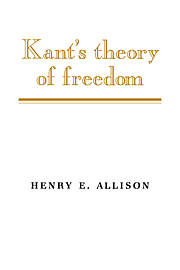Book contents
- Frontmatter
- Contents
- Acknowledgments
- Note on sources and key to abbreviations and translations
- Introduction
- Part I Freedom and rational agency in the Critique of Pure Reason
- 1 The Third Antinomy
- 2 Empirical and intelligible character
- 3 Practical and transcendental freedom
- 4 Two alternative interpretations
- Part II Moral agency and moral psychology
- Part III The justification of morality and freedom
- Notes
- Bibliography
- Index
4 - Two alternative interpretations
Published online by Cambridge University Press: 05 June 2012
- Frontmatter
- Contents
- Acknowledgments
- Note on sources and key to abbreviations and translations
- Introduction
- Part I Freedom and rational agency in the Critique of Pure Reason
- 1 The Third Antinomy
- 2 Empirical and intelligible character
- 3 Practical and transcendental freedom
- 4 Two alternative interpretations
- Part II Moral agency and moral psychology
- Part III The justification of morality and freedom
- Notes
- Bibliography
- Index
Summary
In this chapter I shall try to clarify further the main features of the account of Kant's first Critique theory of freedom sketched in the preceding three chapters by contrasting it with two more or less revisionary interpretations with which it shares considerable common ground but that also reject or explain away a good deal of what has here been claimed to be essential to this theory. These are the well-known interpretation of Lewis White Beck and the suggestive reconstruction of Kant's views in light of Davidson's anomalous monism offered by Ralf Meerbote. In spite of significant differences, both of these authors rely heavily on the strategy of construing the first Critique's account of freedom in light of doctrines developed in the third Critique as a way of saving Kant from himself. We shall see that, in both cases, these rescue efforts are misguided.
Beck's critique and reconstruction
Although he raises many of the familiar objections, Lewis White Beck's analysis of Kant's theory of freedom is distinguished by its attention to the different conceptions of freedom that Kant advances, its sympathetic treatment of transcendental idealism, at least on the two-aspect reading, and its attempt to provide an alternative account of what Kant could and should have said on the topic, which fits within the framework of this idealism. We shall first consider the critique of the theory as it stands and then the proposed alternative.
- Type
- Chapter
- Information
- Kant's Theory of Freedom , pp. 71 - 82Publisher: Cambridge University PressPrint publication year: 1990



